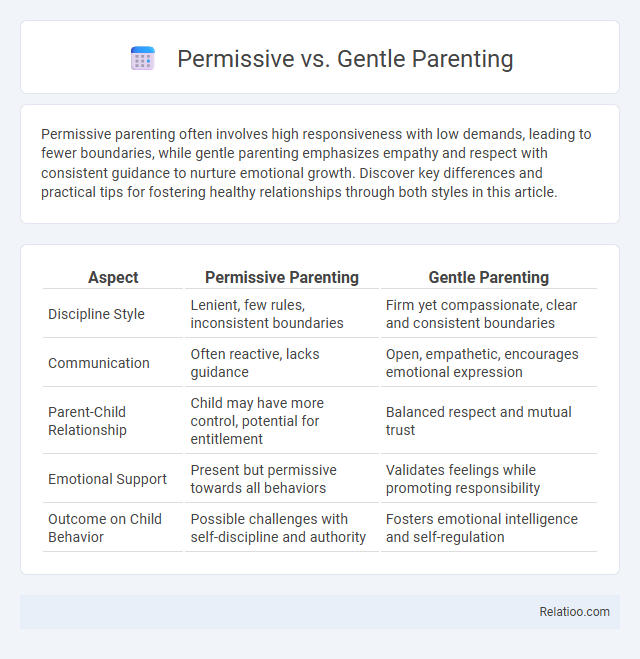Permissive parenting often involves high responsiveness with low demands, leading to fewer boundaries, while gentle parenting emphasizes empathy and respect with consistent guidance to nurture emotional growth. Discover key differences and practical tips for fostering healthy relationships through both styles in this article.
Table of Comparison
| Aspect | Permissive Parenting | Gentle Parenting |
|---|---|---|
| Discipline Style | Lenient, few rules, inconsistent boundaries | Firm yet compassionate, clear and consistent boundaries |
| Communication | Often reactive, lacks guidance | Open, empathetic, encourages emotional expression |
| Parent-Child Relationship | Child may have more control, potential for entitlement | Balanced respect and mutual trust |
| Emotional Support | Present but permissive towards all behaviors | Validates feelings while promoting responsibility |
| Outcome on Child Behavior | Possible challenges with self-discipline and authority | Fosters emotional intelligence and self-regulation |
Introduction to Parenting Styles
Permissive parenting emphasizes high responsiveness with low demands, often allowing children significant freedom and minimal discipline, whereas gentle parenting prioritizes empathy and respect while guiding behavior through positive communication and boundaries. Unlike permissive parenting, gentle parenting fosters emotional connection and consistent structure without harsh punishment. Understanding these distinctions is essential for choosing a parenting style that balances nurturing with appropriate guidance to support healthy child development.
Defining Permissive Parenting
Permissive parenting is characterized by high responsiveness and low demands, where parents set few rules and allow children significant freedom, often avoiding confrontation. This style differs from gentle parenting, which combines kindness and firmness to guide behavior while maintaining clear boundaries. Understanding your approach to permissive parenting helps balance nurturing your child's independence with establishing necessary limits for healthy development.
Core Principles of Gentle Parenting
Gentle parenting emphasizes empathy, respect, and understanding children's emotions, fostering connection without punishment or control, while permissive parenting often lacks consistent boundaries and discipline. Core principles of gentle parenting include active listening, validation of feelings, and guiding behavior through compassion rather than authority. This approach supports emotional development and self-regulation, contrasting with permissive styles that may lead to less structure and predictability.
Key Differences Between Permissive and Gentle Parenting
Permissive parenting tends to lack consistent boundaries and rules, often resulting in children who struggle with self-discipline and authority. Gentle parenting, by contrast, emphasizes empathy, respect, and understanding, fostering emotional connection while maintaining clear expectations and consistent guidance. The key difference lies in gentle parenting's balanced approach to nurturing autonomy while promoting responsibility, unlike permissive parenting which may prioritize freedom over structure.
Impact on Child Development
Permissive parenting, characterized by high responsiveness but low discipline, often leads to children struggling with self-regulation and authority due to inconsistent boundaries. Gentle parenting emphasizes empathy and understanding, promoting emotional intelligence and secure attachments that foster healthy social and emotional development. When balancing permissive traits with gentle approaches, Your child benefits from warmth and respect while still learning essential limits for positive behavioral growth.
Setting Boundaries: Permissive vs Gentle Approaches
Permissive parenting typically lacks firm boundaries, allowing children significant freedom with minimal rules, which can lead to challenges in self-discipline and social expectations. Gentle parenting, while empathetic and nurturing, emphasizes setting clear, consistent boundaries that respect the child's feelings and encourage cooperation through understanding rather than authority. The key difference lies in gentle parenting's balanced approach of kindness combined with structure, whereas permissive parenting often prioritizes freedom over limits.
Discipline Strategies Compared
Permissive parenting emphasizes low discipline and high responsiveness, allowing children significant freedom with minimal rules, which can lead to inconsistent boundaries and challenges with self-control. Gentle parenting focuses on empathetic communication, using positive reinforcement and natural consequences to guide behavior without harsh punishment, promoting emotional intelligence and mutual respect. In contrast, permissive, when strictly defined, often lacks structured discipline strategies, whereas gentle parenting employs intentional guidance balanced with warmth to foster discipline through cooperation rather than control.
Emotional Outcomes for Children
Permissive parenting often leads to children struggling with self-discipline and emotional regulation due to a lack of clear boundaries, whereas gentle parenting emphasizes empathy and understanding, fostering emotional intelligence and secure attachment. Your child is more likely to develop resilience and better social skills under gentle parenting, which balances warmth with appropriate limits. Comparing these styles, permissive approaches may inadvertently increase anxiety and impulsivity, while gentle parenting supports positive emotional outcomes and healthy development.
Common Misconceptions
Permissive and gentle parenting often get confused, but key differences exist: permissive parenting lacks consistent boundaries, leading to potential behavioral issues, while gentle parenting emphasizes empathy and respectful communication. A common misconception is that permissive parenting is synonymous with gentle parenting; however, gentle parenting maintains clear limits with kindness, promoting emotional regulation and cooperation. Your understanding of these distinctions enables better parenting choices that balance warmth and structure effectively.
Choosing the Right Parenting Style
Choosing the right parenting style involves understanding the differences between permissive, gentle, and permissive parenting approaches. Permissive parenting typically features high responsiveness with low demands, while gentle parenting emphasizes empathy, respect, and positive reinforcement without strict discipline. Identifying your child's temperament and your family values helps determine whether a more structured permissive approach or the nurturing, communicative style of gentle parenting best supports healthy development.

Infographic: Permissive vs Gentle Parenting
 relatioo.com
relatioo.com